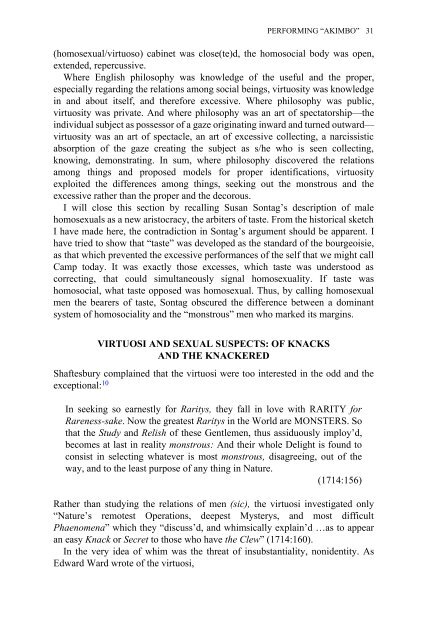Edited by Moe Meyer - Get a Free Blog
Edited by Moe Meyer - Get a Free Blog
Edited by Moe Meyer - Get a Free Blog
Create successful ePaper yourself
Turn your PDF publications into a flip-book with our unique Google optimized e-Paper software.
PERFORMING “AKIMBO” 31<br />
(homosexual/virtuoso) cabinet was close(te)d, the homosocial body was open,<br />
extended, repercussive.<br />
Where English philosophy was knowledge of the useful and the proper,<br />
especially regarding the relations among social beings, virtuosity was knowledge<br />
in and about itself, and therefore excessive. Where philosophy was public,<br />
virtuosity was private. And where philosophy was an art of spectatorship—the<br />
individual subject as possessor of a gaze originating inward and turned outward—<br />
virtuosity was an art of spectacle, an art of excessive collecting, a narcissistic<br />
absorption of the gaze creating the subject as s/he who is seen collecting,<br />
knowing, demonstrating. In sum, where philosophy discovered the relations<br />
among things and proposed models for proper identifications, virtuosity<br />
exploited the differences among things, seeking out the monstrous and the<br />
excessive rather than the proper and the decorous.<br />
I will close this section <strong>by</strong> recalling Susan Sontag’s description of male<br />
homosexuals as a new aristocracy, the arbiters of taste. From the historical sketch<br />
I have made here, the contradiction in Sontag’s argument should be apparent. I<br />
have tried to show that “taste” was developed as the standard of the bourgeoisie,<br />
as that which prevented the excessive performances of the self that we might call<br />
Camp today. It was exactly those excesses, which taste was understood as<br />
correcting, that could simultaneously signal homosexuality. If taste was<br />
homosocial, what taste opposed was homosexual. Thus, <strong>by</strong> calling homosexual<br />
men the bearers of taste, Sontag obscured the difference between a dominant<br />
system of homosociality and the “monstrous” men who marked its margins.<br />
VIRTUOSI AND SEXUAL SUSPECTS: OF KNACKS<br />
AND THE KNACKERED<br />
Shaftesbury complained that the virtuosi were too interested in the odd and the<br />
exceptional: 10<br />
In seeking so earnestly for Raritys, they fall in love with RARITY for<br />
Rareness-sake. Now the greatest Raritys in the World are MONSTERS. So<br />
that the Study and Relish of these Gentlemen, thus assiduously imploy’d,<br />
becomes at last in reality monstrous: And their whole Delight is found to<br />
consist in selecting whatever is most monstrous, disagreeing, out of the<br />
way, and to the least purpose of any thing in Nature.<br />
(1714:156)<br />
Rather than studying the relations of men (sic), the virtuosi investigated only<br />
“Nature’s remotest Operations, deepest Mysterys, and most difficult<br />
Phaenomena” which they “discuss’d, and whimsically explain’d …as to appear<br />
an easy Knack or Secret to those who have the Clew” (1714:160).<br />
In the very idea of whim was the threat of insubstantiality, nonidentity. As<br />
Edward Ward wrote of the virtuosi,


